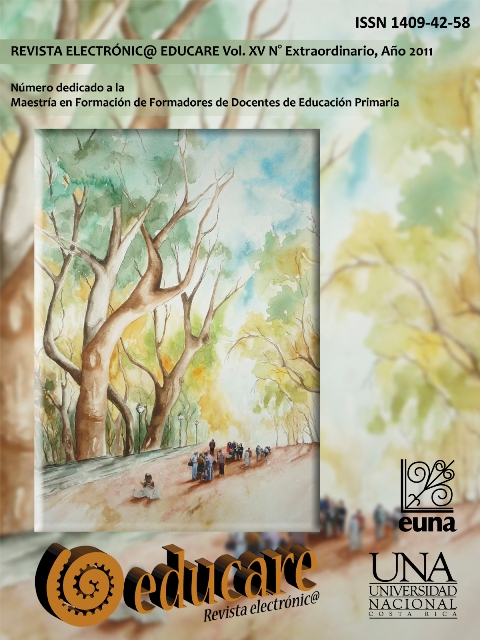Proposal for Labor Market Integration of Teachers in Contexts of High Social Vulnerability
DOI:
https://doi.org/10.15359/ree.15-Ext.4Keywords:
Social vulnerability, labor market integration, institutional permanenceAbstract
The purpose of this paper is to share a proposal for teacher’s labor market integration in contexts of high social5 vulnerability. This paper is the result of a research conducted in a priority attention primary school6 of the central canton of Heredia7. It explored the labor market integration process of teachers, considering the community, family and student reality of a population social risk. The research that supports this proposal is based on a qualitative approach, since the diagnosis process is not intended to provide answers that could be commonly applied to other education centers in similar contexts, but to make an exploratory approach of teachers’ reality and their integration process into education institutions of high social vulnerability. Therefore, although this paper intends to share this experience, it does not aim to unify integration practices, but to be an input in carrying out similar processes.
(5) The concept of high social vulnerability is understood based on Sojo’s approach (2003), which defines it as marginal urban communities in areas considered by the Costa Rican government as priority areas with the greatest social, economic backwardness in the country, and high rates of violence, leisure, unemployment and drug addiction.
(6) Translator’s note: The Costa Rican education system is composed of primary education (1st-6th grade) and secondary education (7th-11th grade).
(7)A public primary school in the circuit 02 of the Province of Heredia.
References
Antúnez, S. y Carnicero, P. [Coords.). (2009). Modelo regional de gestión escolar en Centroamérica
y República Dominicana: Análisis de la situación y propuestas para la convergencia regional.
Universidad de Barcelona: Colección IDER.
Arce, A. I., Gamboa, G., Glock, D., Paitel, P. y Sánchez, M. (2001). Propuesta: Proyecto de creación
de centros educativos bilingües francés-español en la enseñanza pública costarricense: etapa
experimental. San José, Costa Rica: Ministerio de Educación Pública, Asesoría de Francés.
Recuperado de http://www.mep.go.cr/CentroDeInformacion/DOC/12%20%20Proyecto%20
de%20creación%20de%20centros%20educativos%20bilingües%20fra-303200985030.pdf
Barrantes, R. (2001). Investigación: un camino al conocimiento un enfoque cualitativo y
cuantitativo. San José, Costa Rica: EUNED.
Consejo Superior de Educación. (1995). Política Educativa hacia el Siglo XXI. San José, Costa
Rica: Ministerio de Educación Pública.
González, A., Araneda, N., Hernández, J. y Lorca, J. (2005). Inducción profesional docente. Estudios
pedagógicos, 31(1), 51-62. doi: 10.4067/S0718-07052005000100003
González, A. (2005) Promecum: Educación contra la pobreza en Costa Rica. En C. Ornelas (Coord.),
Buenas prácticas de educación básica en América Latina (Tomo I), (288-300). México,
ILCE. Recuperado de http://es.scribd.com/doc/4875276238/38/Promecum-Educacion-contrala-pobreza-en-Costa-Rica
Kinnear, T. y Taylor, J. (2001). Investigación de mercados: un enfoque aplicado (4a
ed.). México.
Editorial McGraw-Hill.
Peralta, V. (2007). Una pedagogía de las oportunidades: Nuevas ventanas para los párvulos latinoamericanos
del siglo XXI. Santiago de Chile: Andrés Bello.
Programa Estado de la Nación en Desarrollo Humano Sostenible. (2008). Estado de la Educación
(2). San José, Costa Rica: CONARE.
Sojo, A. (2003, agosto). Vulnerabilidad social, aseguramiento y diversificación de riesgos en
América Latina y el Caribe. Revista de la CEPAL 80, 121-140. Recuperado de http://www.
eclac.cl/publicaciones/xml/7/19367/lcg2204e-Sojo.pdf
Vonk, J. H. C. (1996). A Knowledge Base for Mentors of Beginning Teachers: Results of a Dutch
Experience. En R. McBridge (Ed.). Teacher Education Policy. Some Issues Arising from
Research and Practice (pp. 113-134). London: Falmer Press.
Downloads
Published
How to Cite
Issue
Section
License
1. In case the submitted paper is accepted for publication, the author(s) FREELY, COSTLESS, EXCLUSIVELY AND FOR AN INDEFINITE TERM transfer copyrights and patrimonial rights to Universidad Nacional (UNA, Costa Rica). For more details check the Originality Statement and Copyright Transfer Agreement
2. REUTILIZATION RIGHTS: UNA authorizes authors to use, for any purpose (among them selfarchiving or autoarchiving) and to publish in the Internet in any electronic site, the paper´'s final version, both approved and published (post print), as long as it is done with a non commercial purpose, does not generate derivates without previous consentment and recognizes both publisher's name and authorship.
3. The submission and possible publication of the paper in the Educare Electronic Journal is ruled by the Journal’s editorial policies, the institutional rules of Universidad Nacional and the laws of the Republic of Costa Rica. Additionally, any possible difference of opinion or future dispute shall be settled in accordance with the mechanisms of Alternative Dispute Resolution and the Costa Rican Jurisdiction.
4. In all cases, it is understood that the opinions issued are those of the authors and do not necessarily reflect the position and opinion of Educare, CIDE or Universidad Nacional, Costa Rica. It is also understood that, in the exercise of academic freedom, the authors have carried out a rogorous scientific-academic process of research, reflection and argumentation thar lays within the thematic scope of interest of the Journal.
5. The papers published by Educare Electronic Journal use a Creative Commons License:















 The articles published by Educare Electronic Journal can be shared with a Creative Commons License:
The articles published by Educare Electronic Journal can be shared with a Creative Commons License: 



